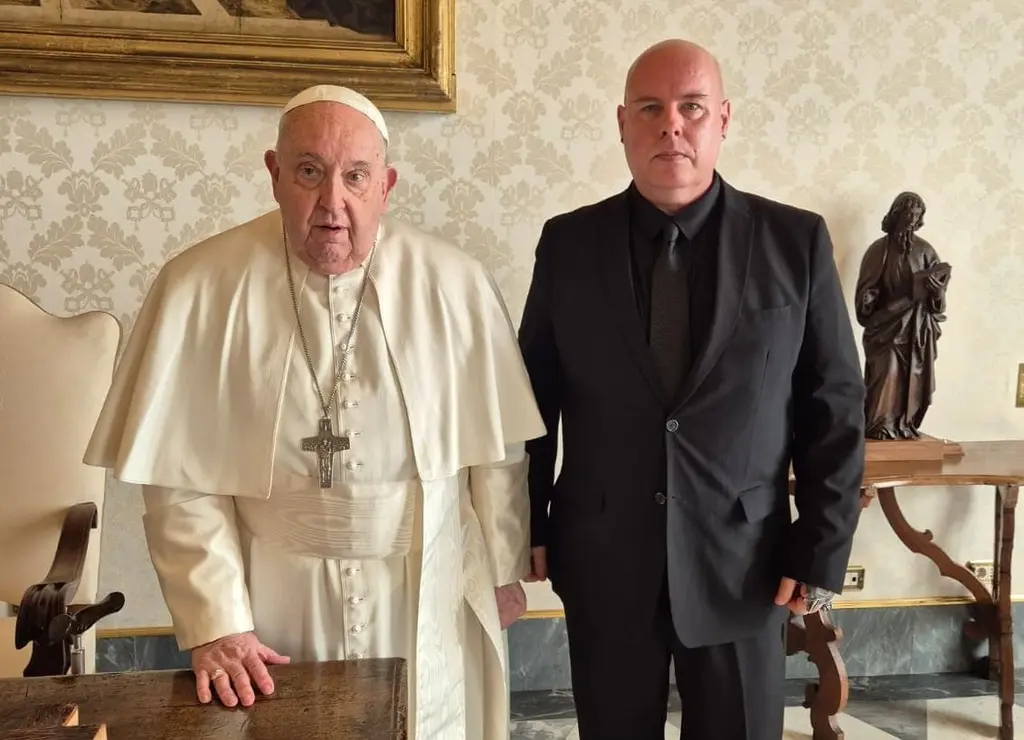Sensitive content
This site contains sensitive content that includes references to sexual violence.
Brave Movement

For 25 years, Jose Enrique Escardó Steck (JEES) has been fighting for justice—not just for himself, but for countless survivors of abuse in Peru and Latin America.
As the first person to publicly expose the horrors of the Sodalitium Christianae Vitae (SCV), a once-powerful Catholic movement, his courage has been met with relentless attacks, but also with groundbreaking victories. And now, in 2025, two of the most significant wins in his decades-long struggle have finally arrived.
On January 24, 2025, Pope Francis personally confirmed the dissolution of SCV to JEES in a private audience, marking the end of a group that for decades wielded immense influence across Latin America. The pontiff´s decision came after an investigation launched in July 2023 into sexual, physical, and psychological abuse, as well as financial misconduct within SCV—an organization once deeply embedded in elite conservative circles in Peru.
For Escardó, who first exposed these abuses in a six-part series of articles in the Peruvian magazine Gente in 2000, this moment was both surreal and deeply significant.
"It was not only like a dream when they granted me the audience, but it is still a dream now, because I feel a lot of happiness—it’s been 25 years of struggle. But I also feel a great burden because there are many voices that I am carrying."
His audience with Pope Francis was a moment of validation—not just for him, but for all survivors and allies who have joined JEES in all these years and fought for justice despite systemic silence and repression.
Just days ahead of his meeting at the Vatican, Escardó took his fight to Geneva, where he informed the United Nations Committee on the Rights of the Child (CRC) commissioners’ of the Soladitium case and the Peruvian’s State’s negligence. His testimony played a key role in the CRC’s historic recommendation on January 31:
"Peru must establish a formal, independent State-led inquiry into child sexual abuse within the Catholic Church. This inquiry must have full powers to examine past and present abuses.
"The government must identify victims and establish a compensation mechanism."
This is a landmark moment—not just for Peru, but for the global movement to hold institutions accountable for child abuse. It sets a precedent for government responsibility in ensuring justice for survivors, rather than leaving the process solely in the hands of the Church.
Escardó’s journey has been anything but easy. As a survivor and activist, he has endured public harassment, intimidation, death threats and years of institutional resistance. Despite this, in 2022 he founded Red de Sobrevivientes Perú (Survivors’ Network Peru), ensuring that those who have suffered similar abuse are not alone.
His fight is far from over, but these victories represent a turning point. They signal that survivors’ voices are finally being heard, that justice is possible, and that those in power—whether in the Church or the State—must be held accountable.
As the Brave Movement, we stand with JEES and all survivors in Peru and beyond. His resilience is a testament to the power of speaking out, of never giving up, and of demanding a world where no child suffers the abuses he endured.
The dissolution of SCV and the UN’s call for accountability are monumental steps, but they must be followed by real action. Peruvian authorities must act swiftly to implement the UN recommendations. Survivors must be at the center of the process, and justice must not be delayed.
We call on everyone—governments, faith communities, civil society—to support this fight. Because when survivors are heard, the world changes for the better.
